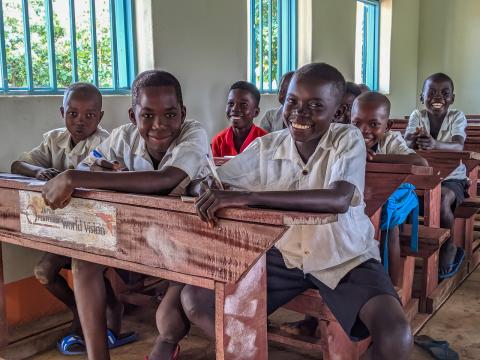Healthy meals and new learning facilities keep 220,293 South Sudanese children in school

- 116,755 acquired numeracy and literacy skills
- 85,253 served meals to promote attendance, retention and completion
- 10,574 received learning materials
- 6,609 benefited from school construction and rehabilitation
- 1,101 provided with psychosocial support
“South Sudan has this big challenge of improving our educational system, build more schools and encourage parents to send their children to school. It needs the concerted effort of everyone, from the communities, the government, humanitarian organizations and support groups”, says Frank Lomoro, World Vision’s Technical Education Advisor in South Sudan.

“More than two million children, or over 70 %, are out of school in South Sudan, putting at risk their futures and the future of the country”, a UN report states, underscoring the sad state of education. It emphasized further that the largest among these out-of-school children are girls, mainly “hindered by poverty, child marriage, as well as, cultural and religious views”.
READ: Teaching teachers new learning methods
Lomoro adds, “The system and infrastructure are still very limited especially for children and youth aged around 3–17 years old, and they represent an estimated 45 percent of the country’s population.”
To help address this urgent need, World Vision has built nine primary school classrooms, along with staff and administrative rooms, complete with toilets in Tambura County, a part of Western Equatoria. One of these schools rehabilitated by World Vision was built in the 70s and a part of the country’s rich history.

Encouraging peace and cultural understanding among school children, sports tournaments are conducted in four schools in Juba. Together with the World Food Programme (WFP), World Vision supports school feeding, holds activities during emergencies, promotes accelerated learning and childhood development programming.
READ: Celebrating the National Girls' Education Week
World Vision’s Country Programme Director Mesfin Loha is undaunted by the challenges in the country’s educational system. He says, “This is a huge opportunity for World Vision, donors and partners to work and pool resources together and address this urgent need. The country can only move forward if we help educate its children.”
World Vision’s education programs in South Sudan are funded by Irish Aid, Japan Platform, UNICEF, UNHCR, the World Food Programme (WFP) and World Vision Korea and were able to support a total of 220, 293 children in its four operational zones namely, Juba, Upper Nile, Warrap and Western Equatoria.

Article by Cecil Laguardia, Communications Manager I Photos by Eugene Combo & Chris Lete/WorldVision